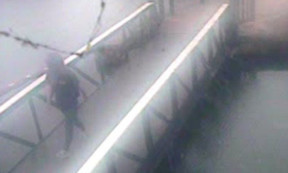
Detectives searching for missing teenager Alice Gross say CCTV will play a “crucial role” in piecing together her last known movements.
As the search for the 14-year-old reaches its fifth week, 30 detectives are painstakingly reviewing material from about 300 cameras covering a six-square-mile area.
Dozens of officers continued carefully combing scrubland next to the Grand Union Canal, west London, where the schoolgirl was last captured on CCTV.
The prime suspect in Alice’s disappearance, convicted murderer Arnis Zalkalns, was filmed cycling along the route the teenager took before she disappeared on Thursday, August 28.
Detective Superintendent Carl Mehta said: “CCTV is clearly crucial in our investigation, but we still need the public’s help and I want to hear from anyone who saw Alice during the afternoon of the Thursday she was last seen.”
Extra officers were drafted in to help the search yesterday in the hope of ending the anguish of Alice’s desperate family.
Searches on land, underwater and by air have so far drawn a blank, despite specialist resources provided by more than a dozen police forces. Officers have been supported by local borough officers and even volunteer police cadets.
Alice was caught on CCTV walking along the towpath next to the canal as it passes under Trumpers Way at 4.26pm on the day she disappeared. She could have taken one of several paths leading back towards her home in Hanwell.
Police received 150 phone calls after staging a reconstruction of Alice’s last known movements.
Investigators said an area of disturbed earth at Elthorne Park in west London, which runs beside the towpath, was no longer of interest.
The latest development in the increasingly desperate hunt came after her parents renewed appeals for information, four weeks since she was last seen.
Her mother, Rosalind Hodgkiss, said: “Every morning, as Alice’s disappearance grows longer and longer, brings new agony, new anguish.”
Mr Mehta stressed that Zalkalns, who was also accused of molesting a 14-year-old girl in 2009, was just “one line of inquiry”.
The force has come under fire for delays in identifying the Latvian as a risk and British detectives would have no power to arrest him if he has fled abroad.
The labourer is thought to have come to the UK in 2007, but authorities here have no record of his conviction for bludgeoning his wife Rudite to death in Latvia.

Enjoy the convenience of having The Sunday Post delivered as a digital ePaper straight to your smartphone, tablet or computer.
Subscribe for only £5.49 a month and enjoy all the benefits of the printed paper as a digital replica.
Subscribe